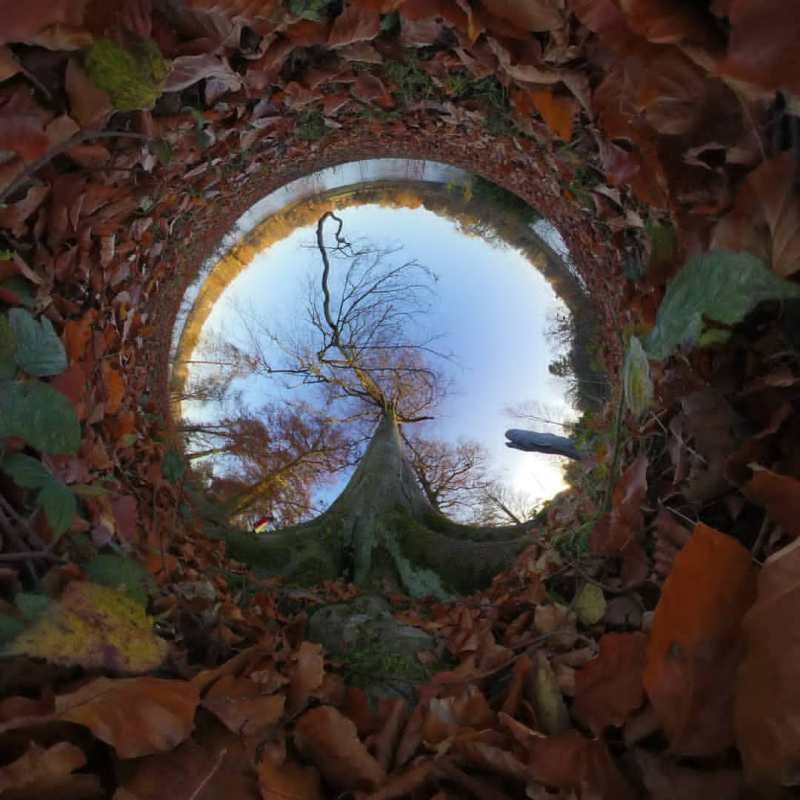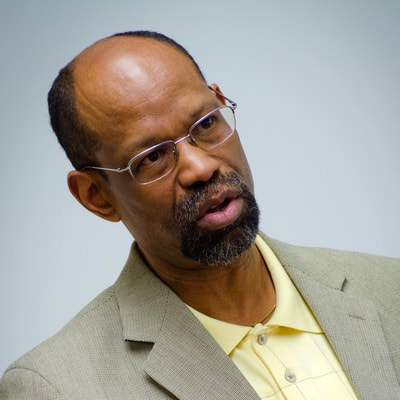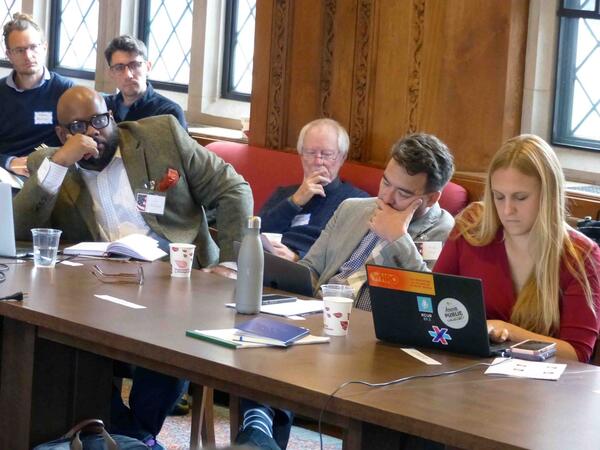The Myth of White Christian Nationalism
by Kenneth L. Woodward
May 2024
In his first speech as Speaker of the U.S. House of Representatives, Mike Johnson sounded like a preacher in a pulpit: "I believe that Scripture, the Bible, is very clear that God is the one who raises up those in authority," he began. "He raised up each of you, all of us. And I believe that God has ordained and allowed each one of us to be brought here for this specific moment and this time."
It was the kind of public piety and Baptist Bible-speak that folks in Johnson’s scarlet-red Louisiana district like to hear from those they send to Congress. It was also inclusive of the Jews, Muslims, and nonbelievers in the chamber. But it wasn’t interpreted that way.
A chorus line of publications, including the New York Times, Washington Post, Time, and Salon, registered alarm: House Republicans had elected a white Christian nationalist to a post just two chairs removed from the presidency. The money quote in the Times came from pollster Robert P. Jones, who labeled Johnson “the embodiment of white Christian nationalism in a tailored suit”—suggesting, not so subtly, that white Christian nationalists belong in white T-shirts and red MAGA hats.
Given a chance on Fox News to defend himself, Johnson said that his politics were to be found in the Bible and that he had never heard the term “Christian nationalist.” I believe him. To be sure, Johnson is a Trumpist and outspoken election denier. That’s not my brand of politics, nor do I think God is as hands-on in American politics as Johnson assumes he is. But according to a 2022 survey by the Pew Research Center, 54 percent of Americans have never heard of Christian nationalism either. And of the 45 percent who have heard at least a little about it, only 5 percent viewed the label favorably.
“White Christian nationalism” entered the political lexicon around 2015 as part of an effort to explain why white evangelical Protestants were drawn to Donald Trump, a thrice-married womanizer who is ignorant of the Bible and says he has no reason to ask God’s forgiveness. Since then, hunter-gatherers in the polling industry have sought to identify and quantify white Christian nationalists through surveys. Beltway journalists have ventured into the wilds of small-town America to profile—and often revile—living, breathing WCNs. And a number of academics, some of them raised in fundamentalist homes, have labored to locate white Christian nationalism within the wellsprings of the American character.
Foremost among the latter is Jones, who, in addition to being founder and former CEO of the Public Religion Research Institute (PRRI), writes books, based in part on his surveys and spiced with slices of autobiography, decrying the effects of white Christian supremacy. He has won the Grawemeyer Award, which in the past went to such eminent scholars as the theologian Jürgen Moltmann and carries a $100,000 prize. The Brookings Institution, a respected left-of-center think tank, has partnered with Jones in identifying the WCNs among us.
Jones’s Baptist roots go generations deep in Southern soil, back to times when there were more Baptists in some towns than there were people—times when Southern Baptists rejected “evangelical” as a Yankee word. He declared himself for Jesus at the strikingly early age of six, and as a teenager he was often at his church five days a week. He graduated from a small Baptist college in Mississippi and then studied for the ministry at Southwestern Baptist Theological Seminary. Only there, he writes, did he learn that slavery was the main issue that had led to the creation of the Southern Baptist Convention, and not until he was a PhD student at Emory University did he learn the extent to which the church had endorsed Jim Crow and abetted the brutality inflicted on southern blacks. “The scales,” he writes, “fell from my eyes.”
Indeed, Jones’s books can best be described as three variations on a line from “Amazing Grace”: “Was blind, but now I see.” In The End of White Christian America (2016), he heralded the cultural and demographic decline of white American Protestants, which was decades-old news, and provided his own journalistic gloss on why and how it happened. The book’s novelty is his invention of White Christian America as the social imaginary that illuminates 150 years of American history.
As the title suggests, White Too Long (2020) is essentially hortatory, a pulpit performance between the covers of a book. The subject is “white supremacy” as the linchpin of White Christian America, but also as the wind propelling the political ascendancy of Donald Trump. This time Jones widens his range to include glances at the tensions between black Catholics and white parishes, but the material he uses is old, derivative, and superficially sourced.
Throughout all his books, Jones champions diversity and inclusion, but only of the familiar race-and-gender kind. He entirely overlooks a side of the American story that historians have long recognized: the significance of white ethnic minorities and of the trials of assimilation that immigrants from all over Europe experienced in the nineteenth century and the first half of the twentieth. And he appears not to realize that the Catholic Church in this country was multicultural long before the most recent tide of Hispanic immigrants.
But my fundamental problem with Jones as a retailer of recent social history is that his basic narrative remains a simplistic and mostly regional story of oppressors and oppressed. I was a civil rights reporter in the mid-1960s, and Jones knows nothing of how the movement disproportionately affected low-income ethnic whites in cities like Boston, Chicago, and Omaha. It was their neighborhoods that were to be integrated, not those of suburban white liberals; it was their children who were to be bused for the sake of school integration, their homes that were subject to blockbusting by ruthless white realtors. Nowhere in Jones’s books do we hear of the urban riots that devastated the inner cities of Newark, Detroit, and Los Angeles. Nor, for that matter, do we hear of the white Southern Baptist clergy—few in number, to be sure—I met in Mississippi who risked their lives to maintain pastoral links with black Baptist congregations.
In his most recent book, The Hidden Roots of White Supremacy and the Path to a Shared American Future (2023), Jones enlarges the category of the oppressed to include indigenous Americans. He also enlarges the category of oppressors to include a couple of fifteenth-century popes. The connection he makes is the “Doctrine of Discovery,” a subject that, he complains, he never encountered during a decade of graduate studies. “But its absence from the historical canon of predominantly white academic institutions,” he assures us, “is testimony to its continued cultural power.” His teachers were blind, but now he sees.
Except he gets the story wrong. The so-called Doctrine of Discovery was first formulated by Chief Justice John Marshall in 1823 in a case involving the right to purchase western lands from Native American tribes. Marshall’s formulation looked back to assorted practices, never uniform or agreed upon, by which European powers had claimed sovereignty over lands they “discovered” during the two centuries of exploration. Marshall himself later rejected the doctrine when he saw it being used to justify moving Native American tribes west of the Mississippi.
Jones argues that in a series of decrees in the late fifteenth century, a few popes gave European rulers “unequivocal theological and moral justification” for exploiting lands and indigenous populations, from Christopher Columbus forward. He claims that these decrees “elevated what had been accepted practice into official church doctrine and international law.” Jones is glossing—badly—arguments advanced by some scholars of indigenous America, but none of the conclusions he draws are true.
First, the decrees he cites never were church doctrine; they were the first in a series of specific directives to the Catholic crowns of Spain and Portugal, giving those nations the right to spread the faith and use it to civilize native populations. They were supported by some Catholic theologians but vigorously challenged by others for, among other things, justifying torture and war to force conversions. In 1537 Pope Paul III replaced the old decrees with his own directives recognizing the natural rights of indigenous peoples—including their right to receive the faith freely and without coercion. Few explorers heeded the pope’s words.
Second, there was no international Law of Discovery before Chief Justice Marshall’s decision of 1823. The Protestant crowns of England certainly did not look to the papacy for moral guidance or approval. Moreover, the crowns, the explorers, and the church all had different agendas. Even among the British settlers, relationships with indigenous tribes were different in Massachusetts Bay than in the Virginia colony. Nothing about this complex history is “unequivocal.”
Jones is fueled by moral indignation, which is admirable when warranted. But his work suffers under the evangelist’s need to condemn and convert. So, with less intensity, do those social scientists, and their amen corner in the media, who insist that white Christian nationalism is a fundamental threat to American democracy. Is it?
Actually, the first question has to be, “What is it?” And the only reliable answer is, “Depends on whom you ask.”
In their 2020 book, Taking America Back for God: Christian Nationalism in the United States, sociologists Samuel Perry and Andrew Whitehead offer this oft-repeated definition: “a cultural framework that blurs distinctions between Christian identity and American identity, viewing the two as closely related and seeking to enhance and preserve their union.”
Simple enough. But in their Time essay on Johnson’s House election, Christian nationalism metastasizes from a theoretical concept to be tested into a litany of liberal mortal sins. Christian nationalists, the authors argued, are Americans who favor “patriarchy, heterosexual marriage, and pronatalism.” They also harbor “a desire for strong leaders who through the threat of violence, or actual violence, defend the preferred social arrangements and hierarchies.” That would be Trump. And, of course, they are nearly always white and prone to racism: For Christian Nationalists, “the ideal American is generally understood to be a natural-born Anglo Protestant.”
In The Flag and the Cross (2022) Perry and Yale sociologist Philip Gorski provide a different, almost anthropological definition. There we learn that white Christian nationalists hold “beliefs that . . . reflect a desire to restore and privilege the myths, values, identity, and authority of a particular ethnocultural tribe. These beliefs add up to a political vision that privileges the tribe. And they seek to put other tribes in their proper place.”
In an interview with New York Magazine, Gorski stressed the narrative element. White Christian nationalists, he argued, are bound together by “an underlying narrative” about themselves, one that honors a “holy trinity” of freedom, order, and violence: “which means a kind of libertarian freedom for people like us—‘us’ being, above all, straight, white, native-born Christian men—order for everybody else, which means racial and gender order above all else, and that kind of righteous violence directed against anybody who violates that order.”
One could cite other definitions, other narratives, but the point is obvious. White Christian nationalism is a social construction the meaning of which depends on who is doing the constructing. Not at all obvious is what same-sex marriage, patriarchy, and encouraging couples to have children (pronatalism) have to do with being white or Christian or nationalist. Even the term is questionable: I think what Whitehead, Perry, and Gorski are trying capture is white Christian nativism, which at least has a traceable social history.
How many Americans are white Christian nationalists?
Again, it depends on whom you ask. White Christian nationalism is not an identity you can assert; it’s an identity that’s applied to you. You can, however, audition for membership simply by assessing the following six statements, which provided the data base for Whitehead and Perry’s work.
The federal government should: “declare the United States a Christian nation,” “advocate Christian values,” “enforce strict separation of church and state,” “allow the display of religious symbols in public spaces,” and “allow prayer in public schools.” And a final statement: “The success of the United States is part of God’s plan.”
Based on responses to these statements, the authors calculated that 51.9 percent of Americans are either full or partial supporters of Christian nationalism. But if you find, as a number of social scientists have, that the statements are too ambiguous to yield precise interpretations, you may doubt—as I do—that the responses tell us anything reliable about what Christian nationalism is or how it might explain political and social behavior.
For example, believing that the government should promote Christian values like justice, honesty, truthfulness, and charity—virtues shared by people of other faiths and people of no faith—hardly makes a respondent a “nationalist” or even a Christian. Again, all sorts of people support the display of religious symbols in public parks, even in New York City. Are they incipient WCNs? And what is the meaning of “strict” separation of church and state? How can any of these questions unearth Americans who support what the authors see as an implicit theocratic threat to the country?
In February 2023, Jones’s polling firm, PRRI, together with the Brookings Institution, issued a study with this no-bones-about-it title: “A Christian Nation? Understanding the Threat of Christian Nationalism to American Democracy and Culture.” Based on responses to a set of five slightly different statements, the survey found that 10 percent “overwhelmingly either agree or completely agree” with all five, and the majority of another 19 percent “mostly” or “completely” agree—a conflation that allowed some media headlines to announce that nearly three in ten Americans support white Christian nationalism.
Three in ten was considerably less than Whitehead and Perry’s claim of 51.9 percent. But as with their survey, the point was to ferret out Christian nationalists and pin the label on them. This motive was evident from the headline Jones put on the PRRI press release: “Two Thirds of White Evangelicals, Most Republicans Sympathetic to Christian Nationalism.” Thus, when Johnson became Speaker of the House last fall, Jones could point to homegrown data in charging that the Republican Party is “the party of white Christian nationalism.”
Unlike PRRI, the Pew Research Center does not undertake advocacy polling. But in 2018, midway through the Trump presidency, Pew released a survey of American religion using a new typology that divided respondents into seven categories, from highly religious to wholly secular. One of these, “God-and-Country Believers,” came close to coinciding with the elusive cohort “Christian nationalists.” These Americans, 12 percent of the adult population, “hold many traditional religious beliefs and tilt right on social and political issues.” They are also much more likely than other Americans “to see immigrants as a threat.” But whereas PRRI reported that the more often respondents attend church, the more likely they were to be white Christian nationalists, Pew found the opposite. God and Country believers were less likely to attend church than the “Sunday Stalwarts,” the 17 percent of Americans Pew found to be the most religiously active.
The fundamental flaw in all these surveys is the presumption that religion is a leading factor in determining how Americans vote. This at a time when church attendance is plummeting amid a general hollowing-out of American Christianity! The more persuasive argument is the reverse: that our politics shape our religion. As political scientist Lilliana Mason wrote in Uncivil Agreement: How Politics Became Our Identity (2018), politics has absorbed and recast all other identities: “A single vote can now indicate a person’s partisan preferences as well as his or her religion, race, ethnicity, gender, neighborhood, and favorite grocery store.” Not to mention which television programs the person watches, and whether he or she drives an electric or a gasoline-powered car.
We know from past presidential elections that the majority of white Catholics end up supporting the eventual winner, regardless of party. Indeed, in 2004 most of them voted against John Kerry, the first Catholic presidential nominee since John F. Kennedy in 1960. Why should we presume that white evangelical Protestants—the category thought to be most closely aligned with white Christian nationalism—are not affected by factors such as income, education, and geography when they enter the polling booth?
For example, the United States is a nation of high-school graduates: Only 37 percent of Americans over the age of twenty-five have four-year college degrees, and evangelicals are more likely than other white Christians to have no more than a high school diploma. That fact affects income. When Trump won the presidency, one-third of white evangelicals were earning less than $30,000 a year—the poverty line for a family of four—and a majority were earning less than $50,000. Trump’s MAGA message promised more jobs and better pay.
Geography matters. The majority of white Americans who identify as evangelicals live in red states, or in red districts of purple states. Most of them reliably vote Republican and did so for Bush, McCain, and Romney. In 2016 they voted for Trump, but so did a majority of white mainline Protestants. White non-Hispanic Catholics chose Trump over Hillary Clinton, 64 to 31 percent.
In sum, “white Christian nationalist” is an inherently political concept. But so is the concept on which it depends: “white evangelical Protestant.” As sociologist Robert Wuthnow has pointed out, the category “Born Again” was added to opinion polls chiefly as “a crude indication of the likelihood that someone [who so self-identifies] will vote Republican” or hold conservative views on issues such as abortion and same-sex marriage. Because polls offer only a few religious labels with which to identify, those picking “evangelical” may be Florida Pentecostals, Texas Baptists, California Quakers, Minnesota Lutherans, Iowa Mennonites, or Fairfax County Episcopalians—groups that share no theological or ecclesiastical connections.
What links all the books and articles and angst about white Christian nationalism is their political present-mindedness, a trait exacerbated by the prospect of another Trump presidency. Surveys give us snapshots, not storylines. The lack of historical perspective—indeed, the absence of references to acknowledged experts in American history—in the works I’ve cited is appalling.
The relationship between Christianity and American nationalism has a long history, against which any new iteration must be understood. That history is replete with efforts by Protestants to connect the American experiment in ordered liberty to some higher purpose, plan, or Planner. For the Puritans of Plymouth Rock that higher purpose was to establish God’s new Promised Land. Later it was to establish a righteous—read Protestant—empire by (in Lincoln’s tempered phrase) an “almost chosen people.” In the Cold War era, when the spread of Communism was the nation’s main concern, both liberals and conservatives advanced their political agendas by appealing to yet other forms of Christian nationalism. And so, in the biblical idiom of freedom and justice, did Martin Luther King Jr.
The political mobilization of southern fundamentalists and evangelicals in 1978 by conservative Republican strategists was a classic example of how politics shapes American religion rather than the reverse. Franklin D. Roosevelt did much the same in drawing Catholics into his New Deal coalition. But the religious landscape in the first quarter of the twenty-first century is very different.
The role of religion in public life is much diminished. Religious beliefs and behavior are more personal, therapeutic, and fluid; and belonging—as indicated by steep declines in church attendance—is fading as a manifestation of religious commitment.
Yes, those who take religion seriously—that is, those who exhibit high levels of religious belonging, behavior, and belief—tend to vote Republican. But they make up only about 17 percent of the population, according to various studies. They are far less numerous than the 28 percent who, according to political scientist David Campbell and his colleagues, identify as “Secularists”—meaning people who are not simply nonreligious, but adamant and active in opposing the presence of religion in the public square. The Secularists alone outnumber, by almost three to one, the 10 percent or so who have been labeled white Christian nationalists. And they overwhelmingly vote for Democrats.
Despite the vagueness of the term “white Christian nationalism” and the difficulty of identifying its adherents, we are certain to hear a great deal more about the threat it poses to American democracy as the election cycle churns on. In the rancid state of American politics, voters are moved more by fear and loathing of the other party than by commitment to their own. Trump’s politics thrives on these emotions. But what will we hear of the Secularists, who are more numerous, wealthier, much better educated, and more politically active than those who have been labeled WCNs? What we will hear is the sound of silence.
Kenneth L. Woodward is the former religion editor at Newsweek.
Image by Glendale United Methodist Church—Nashville, licensed via Creative Commons. Image cropped.




























/cdn.vox-cdn.com/uploads/chorus_image/image/66468603/GettyImages_1203781831.0.jpg)







































































